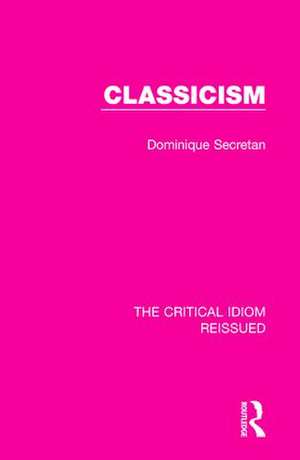Classicism: The Critical Idiom Reissued
Autor Dominique Secretanen Limba Engleză Hardback – 10 iul 2017
| Toate formatele și edițiile | Preț | Express |
|---|---|---|
| Paperback (1) | 323.23 lei 43-57 zile | |
| Taylor & Francis – 17 ian 2019 | 323.23 lei 43-57 zile | |
| Hardback (1) | 496.94 lei 43-57 zile | |
| Taylor & Francis – 10 iul 2017 | 496.94 lei 43-57 zile |
Din seria The Critical Idiom Reissued
-
 Preț: 256.05 lei
Preț: 256.05 lei -
 Preț: 323.23 lei
Preț: 323.23 lei -
 Preț: 323.23 lei
Preț: 323.23 lei -
 Preț: 349.80 lei
Preț: 349.80 lei -
 Preț: 323.23 lei
Preț: 323.23 lei -
 Preț: 323.23 lei
Preț: 323.23 lei -
 Preț: 323.23 lei
Preț: 323.23 lei -
 Preț: 323.23 lei
Preț: 323.23 lei -
 Preț: 323.23 lei
Preț: 323.23 lei -
 Preț: 323.23 lei
Preț: 323.23 lei - 26%
 Preț: 492.05 lei
Preț: 492.05 lei -
 Preț: 323.23 lei
Preț: 323.23 lei -
 Preț: 323.23 lei
Preț: 323.23 lei -
 Preț: 323.23 lei
Preț: 323.23 lei - 25%
 Preț: 496.94 lei
Preț: 496.94 lei -
 Preț: 323.23 lei
Preț: 323.23 lei - 25%
 Preț: 496.94 lei
Preț: 496.94 lei -
 Preț: 323.23 lei
Preț: 323.23 lei -
 Preț: 323.23 lei
Preț: 323.23 lei - 25%
 Preț: 496.94 lei
Preț: 496.94 lei - 25%
 Preț: 496.94 lei
Preț: 496.94 lei - 34%
 Preț: 11146.66 lei
Preț: 11146.66 lei -
 Preț: 323.23 lei
Preț: 323.23 lei - 25%
 Preț: 597.20 lei
Preț: 597.20 lei -
 Preț: 323.23 lei
Preț: 323.23 lei -
 Preț: 309.80 lei
Preț: 309.80 lei -
 Preț: 323.23 lei
Preț: 323.23 lei - 25%
 Preț: 496.94 lei
Preț: 496.94 lei - 25%
 Preț: 496.94 lei
Preț: 496.94 lei - 25%
 Preț: 597.20 lei
Preț: 597.20 lei - 25%
 Preț: 597.20 lei
Preț: 597.20 lei - 25%
 Preț: 496.94 lei
Preț: 496.94 lei -
 Preț: 323.23 lei
Preț: 323.23 lei
Preț: 496.94 lei
Preț vechi: 665.62 lei
-25% Nou
Puncte Express: 745
Preț estimativ în valută:
95.09€ • 99.53$ • 79.14£
95.09€ • 99.53$ • 79.14£
Carte tipărită la comandă
Livrare economică 31 martie-14 aprilie
Preluare comenzi: 021 569.72.76
Specificații
ISBN-13: 9781138283565
ISBN-10: 1138283568
Pagini: 96
Dimensiuni: 129 x 198 mm
Greutate: 0.45 kg
Ediția:1
Editura: Taylor & Francis
Colecția Routledge
Seria The Critical Idiom Reissued
Locul publicării:Oxford, United Kingdom
ISBN-10: 1138283568
Pagini: 96
Dimensiuni: 129 x 198 mm
Greutate: 0.45 kg
Ediția:1
Editura: Taylor & Francis
Colecția Routledge
Seria The Critical Idiom Reissued
Locul publicării:Oxford, United Kingdom
Public țintă
General, Postgraduate, and UndergraduateCuprins
General Editor’s Preface; Preliminary Remark; 1. Introduction 2. Italian Renaissance – Greece and Rome 3. England before the Restoration 4. Renaissance France – Mairet and sundry matters 5. French Classicism: a climax 6. Restoration and Augustan Classicism 7. Some theory 8. Klassizismus und Klassik 9. Epilogue; Select Bibliography; Index
Descriere
First published in 1972, this book provides an overview of Classicism in literature. After an informative introduction to the term, it explores some of the periods and places in which Classicism has been prominent: the Italian Renaissance, England before and during the Restoration, Renaissance France and eighteenth-century Germany. In avoiding a rigid definition of Classicism, this book demonstrates its multiplicity and changeability across time periods, as well as its limits.
